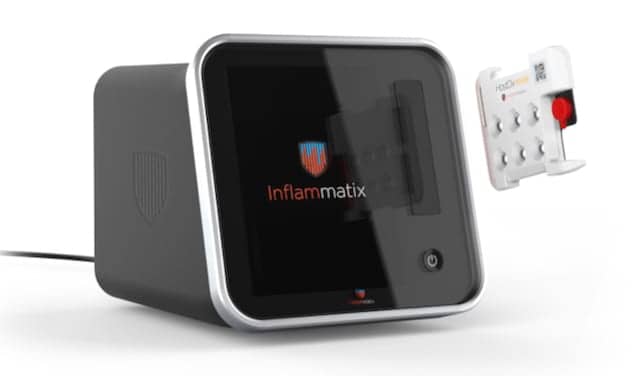Inflammatix, Burlingame, Calif, announced a contract extension of $7.4 million from the Biomedical Advanced Research and Development Authority (BARDA) to further develop its point-of-care test and system to diagnose infection by reading the immune system. The contract is part of a BARDA contract worth up to $72 million, if all options are exercised.
The new funding will support continued development and commercialization of Inflammatix’s sample-to-answer, point-of-care Myrna test system, which is designed to read RNA using machine learning and produce results in under 30 minutes, as well as continued development of the ViraBac EZ test (formerly known as HostDx Fever), which reads gene expression patterns in the immune system to identify whether a suspected infection is bacterial or viral, enabling physicians to quickly and accurately determine when to prescribe antibiotics. The test will use a fingerstick collection and capillary blood sample, and is designed for use in primary care, urgent care, and other outpatient clinical settings.
[Read BARDA Funds HostDx Test Development]
One of the biggest threats to global health today is antibiotic resistance. Increasing and incorrect antibiotic use leads to antibiotic-resistant bacteria that become more difficult and costly to treat, and more deadly. Today, an estimated 30% of antibiotics are inappropriately prescribed to patients because their infections are not obviously bacterial or viral in origin.1 In addition, almost three million Americans each year become infected with bacteria that are resistant to antibiotics, with more than 35,000 dying as a direct result.2 New diagnostic methods that can help better direct antibiotics to only those patients that need them will be an important element in combating antibiotic resistance, ensuring that proven therapies can continue to fight disease and save lives.
“We are pleased to continue to partner with BARDA in the development of our ViraBac EZ test and Myrna instrument,” says Tim Sweeney, MD, PhD, co-founder and chief executive officer of Inflammatix. “Enabling physicians to make more informed decisions about which patients need antibiotics and which can avoid them has the potential to transform patient care at the point of care.”
“In the physician’s office, current methods for diagnosing infections are slow, produce inconsistent results, and/or do not provide the information we need to confidently prescribe treatment,” says David Lin, MD, family medicine specialist with Sutter Health, Sacramento, Calif. “Having a test that allows us to quickly make more informed decisions about which patients are infected and could benefit from antibiotics would have a meaningful impact on patient care.”
For more information, visit Inflammatix.
Featured image: The ViraBac EZ test (formerly the HostDx fever test) from Inflammatix diagnoses acute infections in less than 30 minutes at the point of care.
References
- Hersh AL, King LM, Shapiro DJ, Hicks LA, Fleming-Dutra KE. Unnecessary antibiotic prescribing in US ambulatory care settings, 2010-2015. Clin Infect Dis. 2020; ciaa667, doi.org/10.1093/cid/ciaa667.
- Antibiotic/Antimicrobial Resistance. U.S. Centers for Disease Control and Prevention website. Updated July 20, 2020. Accessed October 7, 2020. https://www.cdc.gov/drugresistance/index.html.





